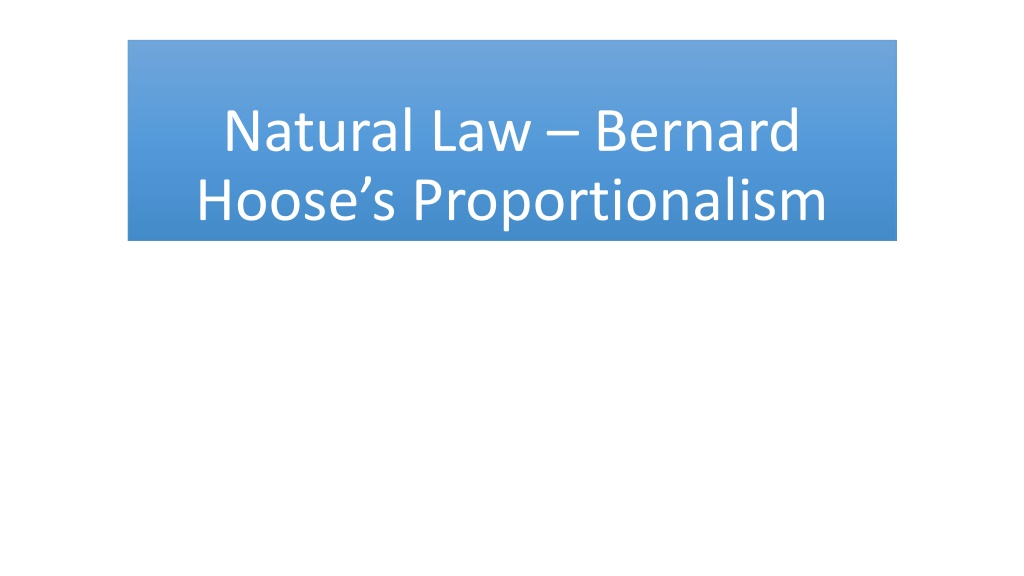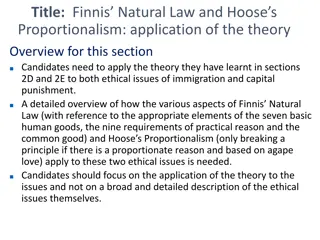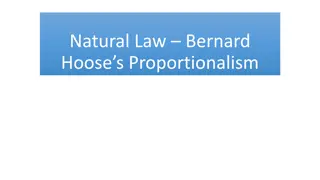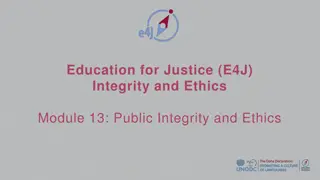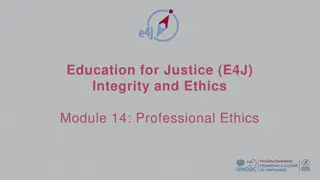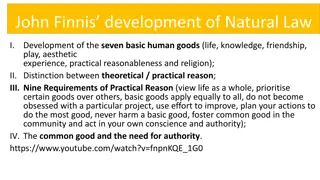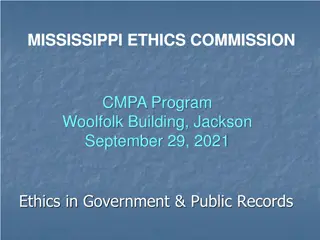Understanding Natural Law, Finnis, and Proportionalism in Ethics
A detailed exploration of Natural Law theory, John Finnis's contributions, and Bernard Hoose's Proportionalism in ethical decision-making. Discusses the universal goods, principles, and applications in areas such as immigration, capital punishment, abortion, and euthanasia. Evaluates the strengths and weaknesses of these theories, highlighting the hybrid nature of Hoose's Proportionalism within the framework of Natural Law.
Uploaded on Oct 07, 2024 | 0 Views
Download Presentation

Please find below an Image/Link to download the presentation.
The content on the website is provided AS IS for your information and personal use only. It may not be sold, licensed, or shared on other websites without obtaining consent from the author. Download presentation by click this link. If you encounter any issues during the download, it is possible that the publisher has removed the file from their server.
E N D
Presentation Transcript
Natural Law Bernard Hoose s Proportionalism
Natural Law summary The goods are universal, self evident, valuable and obvious Application of Finnis Natural Law and Hoose s Proportionalism to immigration and capital punishment Aquinas Application of Natural Law Abortion John Finnis Reason Seven basic goods Key information Purpose - teleological Absolute Precepts Kainz Deontological Nine requirements of practical reason 4 Laws Virtues - Kainz 5 What is the common good Real and apparent goods Interior and exterior acts 4 Why do we need authority Bernard Hoose 3 Voluntary Euthanasia Deontological and teleologica Key information Key idea of proportionalism his maxim 2 Precepts 2 Evil moral act Laws Pre-moral ontic act Virtues Right act Real and apparent goods Good act Interior and exterior acts
Evaluation of Natural Law, Finnis and Proportionalism Evaluation of Natural Law, Finnis and Proportionalism Natural Law Finnis It is a successful theory Strengths Weaknesses It is not a successful theory Hoose Strengths Weaknesses
Natural Law - recap Aquinas natural law was deontological and absolutist. If something prevents the fulfilment of a thing s God given purpose, it is wrong and immoral. Example: Using contraception may prevent the God given will of the reproductive organs. However, as we have looked at there are many flaws with this theory ..
Bernard Hooses Proportionalism Hybrid of Natural Law A modern version of Natural Law, proportionalism, argues from a more teleological perspective. It is viewed as a hybrid. The challenge of natural law is so great that some Catholic theologians believe there needs to be a compromise between Natural Law and Situation Ethics. 'Proportionalism' (the title of a book by British philosopher Bernard Hoose) accepts, as Natural Law does, that certain acts are wrong or evil acts in themselves. However, it says that it might be the right thing to do, if there is a proportionate reason, to perform such acts. there are certain moral rules and it can never be right to go against these unless there is a proportionate reason which would justify it . Bernard Hoose Complete page 12 Deontological means Teleological means Hybrid means
Proportionalism Proportionalism works within the framework of natural law, however is more flexible if a greater good would be achieved by working outside of it. It allows for ontic goods qualities such as dignity, integrity and justice which themselves are not moral but are desirable qualities and should be taken into account when making a moral decision. Aquinas teaching does allow for a degree of proportionalism, i.e. if someone was dying of hunger it would be acceptable to steal rather than die. However However . . A proportionalist may argue that natural law fails to recognise the holistic nature of human beings because it makes a distinction between body and soul, rather than recognizing that humans are a psychophysical unity that combines reason and nature.
Proportionalism Proportionalism A proportionalist may argue that the best we can aim for is a theology of compromise since we live in a fall world (original sin) the best we can aim for is a moral compromise, not moral perfection. It can be seem as more compassionate than natural law in so much as it allows an individuals circumstances to be taken into account. It does not allow for a person to suffer just to uphold natural law and acknowledges some non-moral evils have to be permitted to bring about a greater good. What is most important is bringing about a proportionate amount of good and evil. It recognizes that natural laws must be able to change and that it is impossible to identify laws that are eternally valid without adaptation.
Tasks What is an ontic good? How did Aquinas theory allow some proportionalism? Why is proportionalism seen as more compassionate than Natural Law? What is the distinction between an evil moral act (an immoral act) and a pre-moral/ontic evil act (a bad act that in itself is not immoral)? What is the distinction between a right act (an act that follows the moral rule) and a good act (an act that is not a right act, but creates the lesser of two evils)?
Agape What is agape?
Finnis and Hoose recap 1. What 7 basic goods did Finnis identify? 2. List three points he made about these goods 3. Give 9 words to summarise the principles of practical reasonableness 4. Three challenges to Finnis 5. Three strengths of Finnis 6. How is Hoose s theory seen as a hybrid between deontological and teleological theories? 7. What is proportionalism? 8. According to Hoose how could a wrong act be morally right. 9. Three challenges to Hoose 10. Three strengths of Hoose
Answers 1. 2. 3. Life, knowledge, friendship, play, aesthetic experience, practical reasonableness, religion Universal, self evident, valuable, obvious Whole , prioritise, equally, not obsessed, effort, plan, don t harm a good, community, practical reason Human reason fallible, moral relativism, why those values, religious, not clear, doesn t help with dilemmas More measured, atheists, flexible, modern, community A combination of two theories Proportionalism a more compassionate theory, based on individual circumstances Circumstances Too much freedom, no method, consequentialist, rejects the church, condemned by Vatican 10. Updates NL, Compassionate, Circumstances, effective, Aquinas 4. 5. 6. 7. 8. 9.
Task.. What are the strengths of proportionalism ? What improvements does it make on Natural Law ? Strengths Weaknesses What are the weaknesses of proportionalism ? Next .. Produce a summary diagram or mind map of what proportionalism is.
The weaknesses of Hooses Proportionalism outweigh the strengths. Evaluate this view. Hoose s Proportionalism is a weak theory Hoose s Proportionalism is not a weak theory
Hooses Proportionalism promotes immoral behaviour. Evaluate this view. Hoose s Proportionalism promotes immoral behaviour Hoose s Proportionalism does not promote immoral behaviour
Hoose provides a basis for moral decision making for believers and non-believers. Evaluate this view. Hoose s Proportionalism provides a basis for moral decision making for believers and non- believers Hoose s Proportionalism does not provides a basis for moral decision making for believers and non-believers
